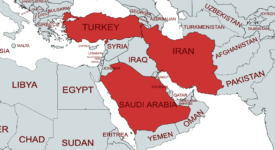Leaders of the 50 countries that comprise the EU and the Arab League, together with the European Institutions, are set to meet in Egypt’s Sharm el Sheikh on 24-25 February in an unprecedented summit encounter. Chaired by Presidents Abdel Fatah El-Sisi and Donald Tusk, the event marks the first time these close neighbours have come together in this format and as such, this is something of a breakthrough.
So why do it now? On the EU side, the growing concerns about irregular migration and terrorism and the need to raise the level of engagement on these issues have certainly played a part, and both will feature high on the Sharm summit agenda. EU High Representative Federica Mogherini has also played a key role – she has worked for this for some time and doubtless considers it an important part of her legacy.
On the Arab side, which has traditionally been the main demandeur for the summit, there has been a strong push for it from President Sisi, eager to restore Egypt’s regional prominence after years in the political doldrums following the Arab Spring, together with support from Saudi Arabia. But the kingdom, contrary to initial plans, will not take a high profile at the event in the aftermath of the death of Saudi journalist Jemal Khashoggi.
As noted, this summit means a lot to President Sisi. The more so, as he is embroiled in a debate at home about amending the Egyptian constitution, in the name of ‘stability’. Top of the list is the proposed revision of presidential term limits, which would allow him to remain in power for another 15 years (he would normally be obliged to step down in 2022). The proposals would also allow him to exercise greater influence over the appointment of judges and give the military even more authority as the guardian of the state.
While the absence of players like the US, Russia, Iran and Turkey means that the summit’s influence on solving regional conflicts is bound to be limited, it could help to give a push to the fragile hopes of progress in Yemen, help to pave the way on how to deal with the coming post-war challenges in Syria and to counter ill-advised efforts by the US and Israel to cajole the Palestinians into accepting an unrealistic peace plan that could very well end up with fanning, rather than dousing, the flames in the region.
The region’s economy is also in need of a boost. There is much that can and should be done to improve EU-Gulf cooperation on investment, both public and private, in the struggling economies of North Africa, not least Egypt itself. Apart from anything else, Cairo should invite the presidents of the major European development banks, such as the EIB, and their Arab counterparts to Sharm as observers. Having the UN in the room would also be good, bearing in mind its peacemaking role in Yemen, Syria and Libya.
Better cooperation on counter-terrorism is also a priority. The military defeat of Daesh in Syria does not solve the problem of extremism. Indeed, it could rear its head again in Europe and elsewhere as IS retreats underground. And with the ever present threat of another toxic migration crisis, the EU needs to work closely with many of the Arab League states to keep things under control.
‘The EU-Arab Summit: A Chance to Reset Relations with the Arab World’ – Commentary by James Moran – Centre for European Policy Studies / CEPS.
(The Commentary can be downloaded here)







